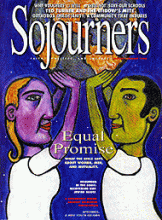Earlier this year Britain and much of the world was mourning the death of Diana, Princess of Wales, in a tragic car accident. The people cried out for a due honoring of their "Queen of Hearts," and criticized the royal family for not hearing the nations pain. In the end, the queen addressed her subjects, and the court adapted their protocol to honor Diana, amid talk of it being "too little, too late."
The church could do well to adapt and develop rituals according to the needs of the people. And this is precisely what Megan McKenna calls for in her recent book, Rites of Justice.
McKenna is a Catholic scholar and retreat leader who would be well-suited to preaching, judging by her book. The Catholic Church might not let her take the pulpit, but in her writing she calls passionately for a greater commitment and recommitment to lives of faith and service. In addition to the Bible and church teaching, McKenna says we can find in the sacraments themselves an ethic to guide our daily lives.
The fairy-tale-like stories McKenna offers to introduce us to the ethical points she draws out of each sacrament make this book a joy to read. She quotes thinkers and activists such as Dorothy Day, Elie Wiesel, and Abraham Heschel, from which she has obviously drawn inspiration and strength; their presence forms a supportive community within her own book. McKenna claims that "Sacrament is symbol, mystery, an icon, a doorway where God comes in." Many post-Vatican II Catholics might not know rituals as a channel for grace, or even be able to name the sacraments. (They are baptism, Eucharist, anointing of the sick, confirmation, holy orders, penance-reconciliation, and matrimony.) Unfortunately, for readers unfamiliar with the traditional rites, McKennas descriptions of the various rituals may not provide a clear picture of how they are performed.
Read the Full Article
